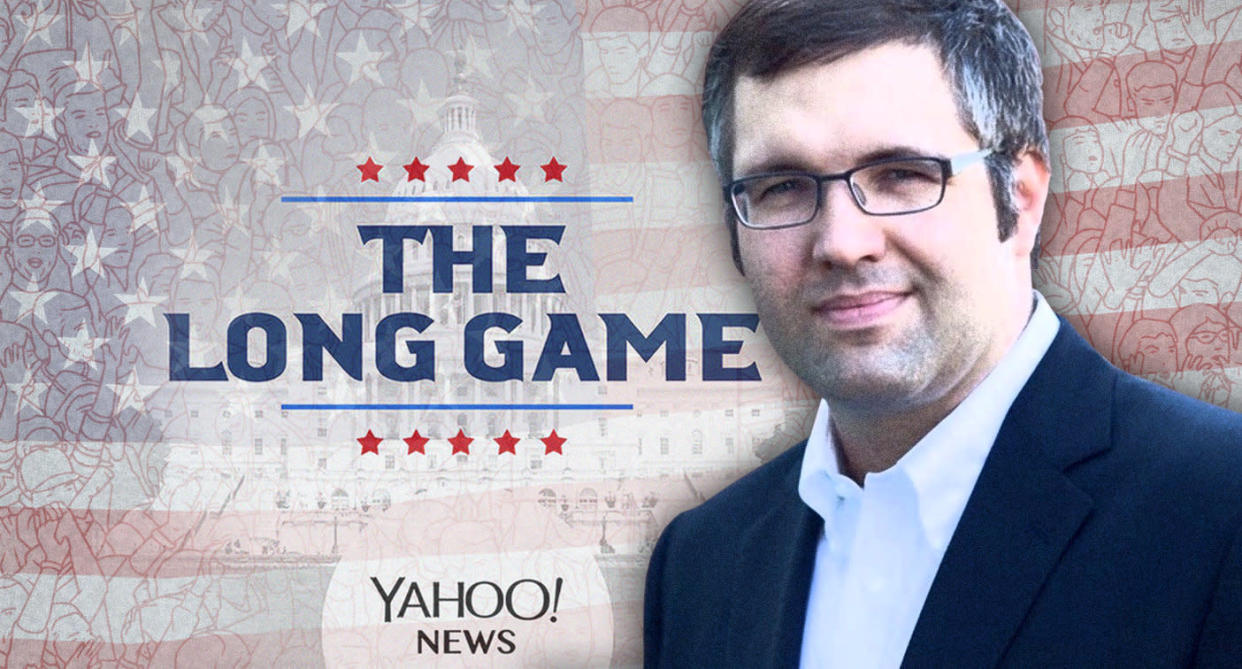A 'new establishment' is needed, digital pioneer says

Nicco Mele went from running the groundbreaking online organizing and fundraising efforts for Howard Dean’s 2004 presidential campaign to writing a book warning that the internet was opening the door to “chaos, destabilization, fascism and other ills.”
Now, he says, many of the dark prophecies from his 2013 book, “The End of Big,” have come truer than he had anticipated, and there is a long way to go to repair the damage.
“In many ways since I wrote the book things have come more apart,” Mele said in an interview on the Yahoo News podcast “The Long Game.”
We are stuck, currently, with a reality where there are “two worlds” existing side by side as it relates to power and influence, Mele said. There is the old institutional world, where hierarchy, experience, expertise and tradition are core values. And there is the new connected world that is tearing down the old, where power and influence are far more diffuse and broadly shared.
The two need to be connected and fused, he said.
Mele, who has been director of the Shorenstein Center on Media, Politics and Public Policy at the Harvard Kennedy School since 2016, warned in his book that “radical connectivity is altering the exercise of power faster than we can understand it.” In the “Long Game” interview, Mele said there remains a deep need for new institutions to be built that embody the values of the modern online world, but resurface some older values as well.
For example, the idea of an “establishment” existing at all is often decried as inherently undesirable, and institutions are then vilified as tools of a corrupt elite. But, Mele said, that is a bad bargain for everyone. He called for a “new establishment.”
“I think we do need a new establishment but we also need to think about what values we want that establishment to have. There’s certainly a critical role for expertise and knowledge,” Mele said.
He did not come down definitively on one side of the question of whether change in uprooting existing systems and institutions should be radical or gradual.
“I don’t love the idea of just blowing it up, because there’s a lot of collateral damage along the way. On the other hand, the institutional rot is so calcified that incrementalism is going to be of limited use,” he said. “In many ways what I think we have to do is just imagine and build a parallel infrastructure.”
The online processing payment company ActBlue is an example of such a parallel institution, he said, because it lowered the barrier to entry into politics by enabling candidates to raise money in small amounts online.
“If the [Democratic Congressional Campaign Committee] had built ActBlue … [Alexandria Ocasio-Cortez] never would have been allowed to raise money on it to challenge an incumbent member of the party leadership,” Mele said.
Mele said that when he moved from Boston to Los Angeles in 2014 to become senior vice president and deputy publisher at the Los Angeles Times, it opened his eyes to something he had overlooked in his book.
“The book really misses race and to a large extent privilege,” he said. The move from Boston to Los Angeles changed his perspective, he said.
“I went from a very white professional & personal community to a professional and personal community where I was frequently the only white person in the room,” Mele said. “It really had a profound impact on my view of America and the role that race and immigration play in our cultural fabric and our institutions.”
The conversation around systemic racial injustice, he said, “substantially complicates” attempts to look back — as he recommended in his book — to how a more centralized party nomination system a few decades ago “produced leaders who for the most part were basically competent, knowledgeable, civic-minded, and capable of taking a longer-term view.”
“Radical connectivity” has opened up “new ways of organizing and shaking the money tree,” he wrote in his book. But the new connected world, in tearing down party power, had failed to produce “a system of producing crops of generally decent, competent, civic-minded political leaders,” he wrote.
In fact, it’s increasing polarization “by enabling formerly marginal candidates with little stake in the status quo to move to the forefront of the debate.”
Mele warned then of a “dangerous populism” that could “take hold of our political system” through “radical connectivity.”
“We get exciting candidates like Barack Obama who can shake up the system but also extremist or fringe candidates who, if elected, could bring the whole house down,” he wrote.
Many critics of Trump would see that statement as a direct prophecy of the current presidency.



